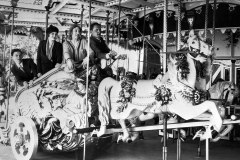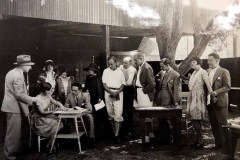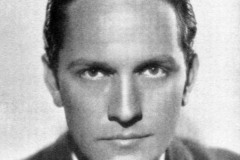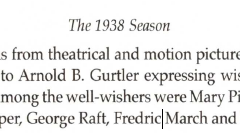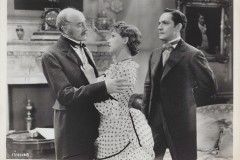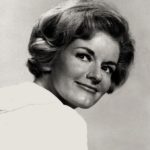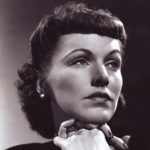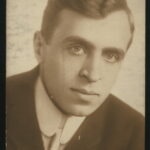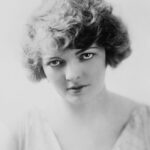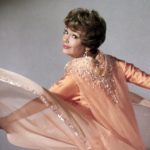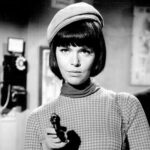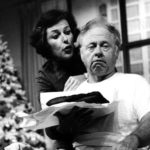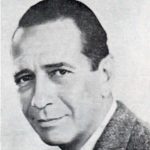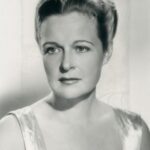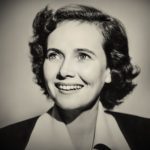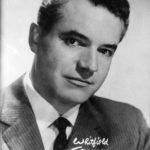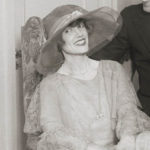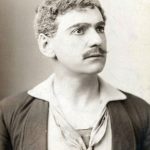Fredric March’s career was an example of combining hard work with extraordinary talent.
After being graduated from the University of Wisconsin, he endeavored to follow his family’s desires and become a banker. After a few months’ work in New York he decided that banking was not his forte, and he turned to the stage.
He finally received a small part in a David Belasco production and then went into stock, playing with the Mabel Brownell company and others. In 1925, March appeared in New York as the leading man in The Half Caste. He was seen by Melville Burke, the director at Elitch Theatre, who was so impressed with his performance that he engaged him as the leading man at Elitch for the 1926 season. In reflecting upon his acting career, and his three seasons as a lead actor at Elitch Theatre, Fredric March, in an interview in 1952, stated:
I felt exceedingly fortunate to be selected as leading man in 1926. It was the tradition of the place. At that time it was known all over the East and it was considered a feather in the cap of an actor to have played a season at Elitch. Anyone who was successful there had an excellent chance of getting better parts when he returned to New York.
[Borrillo, Theodore A., (2012). Denver’s historic Elitch Theatre : a nostalgic journey (a history of its times). pp. 143.]
Fredric March and Florence Eldridge were the lead actors for the (1926) season. In a book entitled The Elitch Garden Story (Memories of Jack Gurtler), by Jack Gurtler and Corinne Hunt, and published in 1982, the following story is told about Fredric March and Florence Eldridge. John Mulvihill (Gurtler’s grandfather), had a policy that no leading man would be married to his leading lady because he believed that “people would not pay money to watch a man make love to his own wife on stage.” During the run, Fredric March informed John Mulvihill that he was in love with Florence Eldridge and that they wanted to get married. Mulvihill alerted March to his policy. March may not have taken him seriously, for he and Florence Eldridge drove to Colorado Springs and got married. Mulvihill confronted March, saying “I understand that you are now man and wife,” to which March replied, “That’s right, J.M.! I love this girl too much to take the chance of losing her by waiting till the season’s over.” Mulvihill fired Florence Eldridge. Mulvihill had already engaged another to play her part during the season.
The story is at variance with interviews that Edwin Levy, head of the theater department at the University of Denver, had with Fredric March and Melville Burke in 1952 and 1953, respectively. The interviews revealed the following:
Miss Eldridge met Mr. March at the home of a mutual friend in New York before the summer of 1926. After the Elitch season, they were married in Mexico. Manager Mulvihill, making plans for the season of 1927, believed audiences would not be interested in seeing a leading man play love scenes with his own wife on stage and decided not to rehire Miss Eldridge for the summer of 1927.
[Borrillo, Theodore A., (2012). Denver’s historic Elitch Theatre : a nostalgic journey (a history of its times). pp. 139.]
However, for another narrative, according to the dissertation by Vicki Payne Parrish: “The American Stage Careers of Fredric March and Florence Eldridge”
The Marches first met while members of the Elitch’s Gardens Summer Theatre company, in Denver, Colorado in 1926. At the time, Eldridge was a young rising star on the Broadway stage, while March had just begun to break into the Broadway spotlight. Elitch’s Gardens provided them a learning opportunity which had nurtured many other theatre illuminaries. The oldest summer theatre in America, Elitch’s counted among their alumni some of America’s finest actors including Minnie Maddern Fiske, Beaulah Bondi, David Warfield, Douglas Fairbanks, Sr., Cecil B. DeMille, Edward G. Robinson, Sylvia Sidney and countless others.
[Parrish, Vicki Payne. “The American Stage Careers of Fredric March and Florence Eldridge,” p. 3.]
Seasons at the Theatre
Productions/Roles:
Notable Roles, Awards, and Other Work:
- March received numerous accolades including two Academy Awards, a Golden Globe Award, and two Tony Awards as well as nominations for three BAFTA Awards and three Emmy Awards.
- March received two Academy Awards, for his performances in Dr. Jekyll and Mr. Hyde (1931) and The Best Years of Our Lives (1947).
Elitch Theatre Connections:
- The 1932 film, Merrily We Go to Hell, as well as the 1934 film, Good Dame, starred March and alumna, Sylvia Sidney.
- March appeared in Honor Among Lovers with Ginger Rogers.
- The film The Best Years of our Lives starred March, as well as alumna, Myrna Loy and Teresa Wright.
- In 1931, March co-starred with Elitch Alum Rose Hobart in the film version of Dr. Jekyll and Mr. Hyde (1931).
- Appeared on Broadway with his wife, Florence Eldridge, in Long Day’s Journey into Night.
- On Broadway in The Autumn Garden with alums, Florence Eldridge and Kent Smith.
- March appeared in multiple films with his wife, Elitch Theatre Alum, Florence Eldridge, including Les Misérables and Christopher Columbus .
- March starred in Inherit the Wind and the cast included his wife, Elitch Theatre Alumna, Florence Eldridge.
- The original Broadway production of The American Way opened at the Center Theatre on January 21, 1939. March appeared with Florence Eldridge. Elitch Alum, Dick Van Patten, had a role as Martin’s grandson, Karl, at age 9; and HET alum, David Wayne, played an adult version of the same character.

